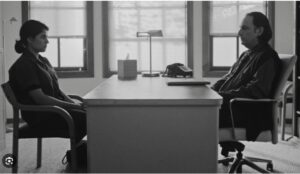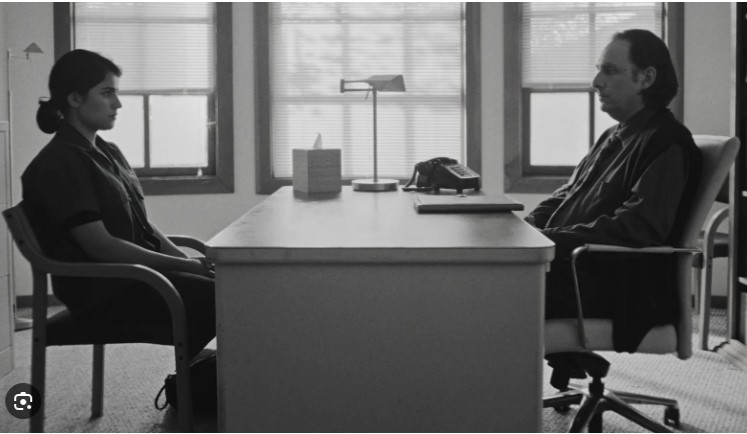Movie Info
Movie Info
- Director
- Babak Jalali
- Run Time
- 1 hour and 31 minutes
- Rating
- Not Rated
VP Content Ratings
- Violence
- 0/10
- Language
- 2/10
- Sex & Nudity
- 1/10
- Star Rating
Relevant Quotes
I am like a desert owl of the wilderness,
like a little owl of the waste places. I lie awake;
I am like a lonely bird on the housetop.

Iranian filmmaker Babak Jalali’s film about a refugee from Afghanistan is the second immigrant or refugee film that I have seen within the same week. But it is as different from The Swimmer as possible. It is not a sports success story, but one of bleak loneliness that is underlined by the director choosing to shoot his film in black and white. It’s setting and title is apparently due to the fact this suburb of San Francisco contains the nation’s largest population of Afghans , most of whom have not yet assimilated into the majority culture.
Real-life Afghan refugee Anaita Wali Zada portrays Donya who had to flee her native land because she worked as a translator for the American military before the Taliban took over the nation. She now lives in a tiny room in a Fremont apartment complex, her neighbors whom she sees mainly at night, also being from Afghanistan. At least one of them regards her as a traitor because she helped the American invaders. Her one friend with whom she often talks on her cellphone, Joanna (Hilda Schmelling), tells her she should get a double bed so as to be welcoming, but Donya points out that it would not fit into her little room.
During the day she packages fortune cookies at a small factory owned by a kindly Chinese couple. Donya is unable to sleep nights because of her sense of survival’s guilt. How can she pursue love or happiness while others back home are in danger from the Taliban? When the elderly woman who composes the pithy sayings that her fellow workers place inside the fortune cookies keels over dead from a heart attack, Donya is summoned, interviewed, and given her job. “People with memories write beautifully,” the owner says as he bestows upon her the promotion.
Donya wants badly to see a therapist so she can obtain a prescription that will enable her to sleep. She brashly manages to jump the long line, so that she visits weekly therapist Dr. Anthony (Gregg Turkington). He turns out to be a strange person who may be using his patients as much for his own mental health as to help them. He puts her through various tests. He thinks she has PTS, so he brushes aside her requests for sleeping pills.
During one session she says, “I don’t spend much time thinking,” and to his “Why?” replies, “Too busy with my social life.” We laugh at this because her only social life is the elderly owner of the Middle Eastern café where she consumes her supper alone, apparently the only customer in the place. Close by, leaning against the wall the man stands watching an Afghan soap opera playing on the wall-mounted TV set. They exchange a few pleasantries: he even jokes that he will poison her food if she tells anyone that he watches such fare. After several such scenes, he comments, “I can’t tell if this series is interesting, or if my own life is uninteresting.” This could refer to Donya’s own life as well. Back at her apartment, late at night when she is unable to sleep, she goes out onto the balcony where one of her neighbors, Suleyman (Timur Nusratty) and Salim (Siddique Ahmed), are often smoking a cigarette. We learn that another neighbor will not speak to her because she thinks Donya was a traitor because she worked for the Americans.
The film is anything but theatrically dramatic, preferring a nuanced approach to Donya’s refugee story. When Joanna sings the folk song “Diamond Day,” the camera turns to Donya’s face. She is silently crying, the song bringing back childhood memories.
In one therapy session Dr. Anthony shows Donya a batch of fortune cookie sayings that he has written, but she does not respond to his obvious attempt to illicit positive feedback from her. In perhaps an even funnier session he expounds upon his favorite book, Jack London’s White Fang, working it into his therapy advice. He somehow sees a parallel between the story of a wild wolf/dog becoming domesticated with that of an alien trying to adapt to life in America.
Donya becomes so desperate to connect with some that she types on a cookie slip: “Desperate for a dream” and includes her name and number. By sending her plea out into the world, she is led to take a journey, its distant geographic location coinciding with her inner journey of reaching out. Her car needing attention, she is greeted by a mechanic named Daniel (Jeremy Allen White). From his words “I usually eat my lunch here,” he tells her, motioning to the grubby garage, “and for dinner I’ll eat here, too.” But this time he joins her at the nearby diner. The final shot of Donya is suffused with hope, Donya standing by herself beneath a tree close to a set of railroad tracks. Beside her is an old car wreck and a cast-off armchair, symbols of lonely abandonment, and yet the suffused light suggests a heavenly hope. Donya has been, like the sleep-deprived Psalmist, “like a lonely bird on the housetop.” Maybe she has at last found another “lonely bird,” their common need for companionship able to transcend the huge differences in their cultures.
The dialogue in the film is as spare as the action. This is a slow-paced film calling for the patience and discernment that some viewers, accustomed to the action of superhero blockbusters will find difficult to stay with the film. The crisp, black and white photography perfectly matches Donya’s bleak mindscape—and that of the café owner and other characters as well. Director Babak Jalali employs mainly on facial closeups of his cast. Often, he lingers over Donya’s face even when she is not speaking. This calls for the actress to communicate through her facial expressions more than through the words from her mouth, and newcomer Anaita Wali Zada is more than up to the task. We se clearly her pain and longing for connection. I look forward to seeing her in future films!
This review is in the Oct. issue of VP along with a set of questions for reflection and/or discussion. If you have found reviews on this site helpful, please consider purchasing a subscription or individual issue in The Store.

